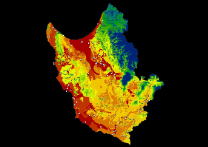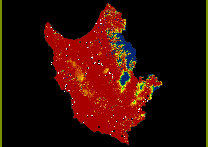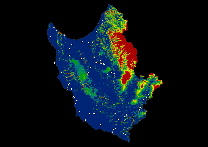Cypriot Archaeology and the Western Cyprus Survey
Cyprus has a rich archaeological history and the prehistory of the island has been well covered in the past couple of decades (Peltenburg 1989, Swiny 2001, Steel 2004, Peltenburg & Wasse 2004, Knapp 2008). But until relatively recently the West of Cyprus was regarded as an impoverished region (Bolger et al. 2004) and it was assumed to have been colonised after the Neolithic (Karageorghis 1982 and Stanley-Price 1979). Since the 1970s the Lemba Archaeological Project (LAP) has been conducting the Western Cyprus Survey, gathering data on sites relating to the Neolithic and Chalcolithic periods in an attempt to gain a greater understanding of the prehistory of the region.
A three-tier strategy of inventory research, extensive and intensive survey has led to the identification of more than 150 sites of the Neolithic and Chalcolithic periods. Their locations are dispersed across a large area, c.1400km2, which is topographically fragmented with narrow coastal plains, deeply incised river valleys, a single broad drainage system, and a discrete but extensive plateau, all backing on to the foothills and mountains of the central Troodos massif (Bolger et al. 2004). Equally diverse is the regions geology, soil cover and vegetation.
Since the implementation of the Western Cyprus Survey further data has become available from other surveys, providing additional evidence for the presence and distribution of Prehistoric sites in the West of Cyprus (Stanley-Price 1979, Baird 1984, Held 1992, Rupp et al. 1992, Maliszewski 1995, Given & Knapp 2003) some of which have been incorporated into the Western Cyprus Survey and revisited.
It is not the intention of this project to review or evaluate the methods and practices employed by the varied range of archaeological surveys conducted within Cyprus. However it is worth noting that regional studies have only recently become accepted as a valid way to examine archaeological landscapes (Given & Knapp, 2003). Debates are still ongoing regarding the scale at which surveys should be conducted but as Bolger et al. (2004, p2) state
"there are others who argue that survey, like excavation, has come of such an age whereby it is robust enough to embrace different research goals and methods."



